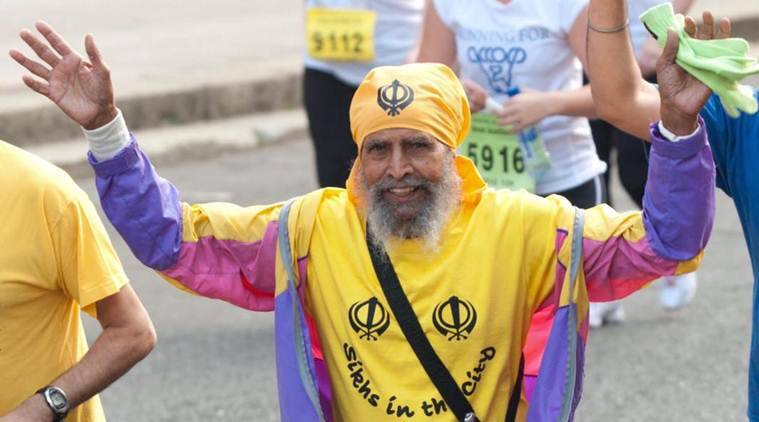“Sagey bhraavan vich khaar hundi hai, saada taan imaandaari da rishta si. Mera bhraa siga, mera yaar siga Amrik (Real brothers have differences, but we shared an honest relationship. He was my brother, my best friend).” Fauja Singh, 109 years old and believed to be the world’s oldest marathon runner, bursts into tears at the mere mention of his friend and running mate, Amrik Singh, who succumbed to coronavirus infection on April 22. Amrik (89) passed away at Birmingham’s City Hospital with doctors struggling to understand his last words.
“His every sentence would end with ‘Waheguru‘ and doctors asked us if he was trying to call any loved one. He just kept saying ‘Waheguru, Waheguru‘… my grandfather was known ‘Waheguru Baba’ in the community,” says Paman Singh (34), his grandson from Glasgow in Scotland.
Back home in Glasgow’s Bearsden, Amrik has left behind a collection of over 650 medals which he won running across the world, including at least a hundred marathons.
Much before Fauja Singh rose to international fame and became the world’s oldest runner to complete a marathon in 2011 at age of 100, there were two other Sikhs — Amrik Singh and his companion, Ajit Singh, who started participating in competitive racing in the UK. Later, when Fauja joined them, the trio became a familiar face at UK marathons and they formed a running club ‘Team Fauja’.
Fauja admits that it was both of them who “inspired” and “forced” him to get formal training for marathons. From Edinburgh to Luxembourg, Lisbon to New York, London and even Lahore in Pakistan— Fauja remembers how they ran together multiple times, around the world, having the time of their lives.
“Lahore nahi bhulna kadi, assi Lahore vi daudey katthey. Main kalla reh gaya hun (I will never forget Lahore, we ran together in Lahore also. I am left alone now),” says an inconsolable Fauja, while speaking over phone from his village Beas Pind in Jalandhar.
“Five of them ran together at Edinburgh Marathon relay in 2009. But Fauja, Amrik and Ajit were the closest. It was probably in 2006 when trio was invited to Pakistan by then president Pervez Musharraf and they ran together in Lahore. In 2010, they ran together at ‘Sikhs in the City Relay Marathon’ in London which was probably their last together,” remembers Harmander Singh (61), Fauja Singh’s coach.
“Ajit and Amrik had started running at least 25 years before Fauja. Fauja was in London, Ajit from Huddersfield and Amrik from Glasgow. It was in 1999 that Fauja started formal training with me,” he adds, while pointing out that the trio ran at least 20 races together.
Amrik started running when he was 46, and completed London marathon 26 times. From UK, Australia, US to Portugal, he always ran with Khalsa symbols at full display– a khanda on his dastaar (turban) and kirpan around his neck.
Paman Singh, says that like every year, his grandfather Amrik Singh was at his native village Paddi Khalsa in Jalandhar of Punjab from February 12 to March 13, where he would perform sewa, organise eye check-up camp, collect donations for homeless and fund education of poor children.
At medical camps, he would change bedsheets of patients, help them in having food and take them to washrooms. “He would collect donations from NRIs in Scotland and distribute to poor at his village in India. He would buy new clothes for all children in village before India trip,” he said.
“He returned to Birmingham on March 13 to my aunt’s place (Amrik’s daughter) and was doing completely okay. He was earlier having some health conditions but they were all under control now. Suddenly on April 12, he started showing symptoms and had fever and cough. He was tested positive for coronavirus and passed away ten days later on April 22,” says Paman Singh. “The ‘Great Scottish Run’ last year was his last individual run,” he said.
The family says they have no idea where he got infected.
“He always had simple and healthy food — dal roti, panjeeri, hot milk, ghee and would sometimes cheat with jalebis. He loved his Punjab. We have no idea how he got infected. He would go to gym every day,” the grandson adds.
Amrik had started working as a construction worker (mason) in Gravesend of Kent in the UK near London in 1960s and later moved to Scotland in 1970 where he opened a general store called ‘Sumal’s Mini Market’. He then started langar charity service for homeless which his children and local volunteers later named as ‘Scotland Seva’.
He would visit local Central Gurdwara Singh Sabha in Glasgow everyday and take care of Indian students irrespective of them being Hindus, Muslims, Sikhs — and would ensure they had food. He would even arrange shoes and clean dishes.
And even in his last days, Amrik continued doing what he lived for — serving homeless and poor. After the UK went under a lockdown on March 23, he instructed Paman Singh on phone that langar sewa, which family ran twice a week, should now be run daily and all nurses, doctors, firemen, policemen serving in Glasgow should also be fed by Scotland Seva volunteers.
“He told me over phone from Birmingham before being hospitalised that ‘aapan sewa ni kadey chadni, Waheguru da naam laike sab kuch karna hai… (We will never leave sewa. Take Waheguru’s name and go on with it),” says Paman, recalling the final lesson his grandfather gave him before being snatched away by the deadly virus.










More Stories
How Japan Airlines crew led 367 passengers to safety from a burning plane
Rishi Sunak declares success in meeting UK’s asylum target
Electroplus Ltd Sponsors the Truth Story Newspaper News